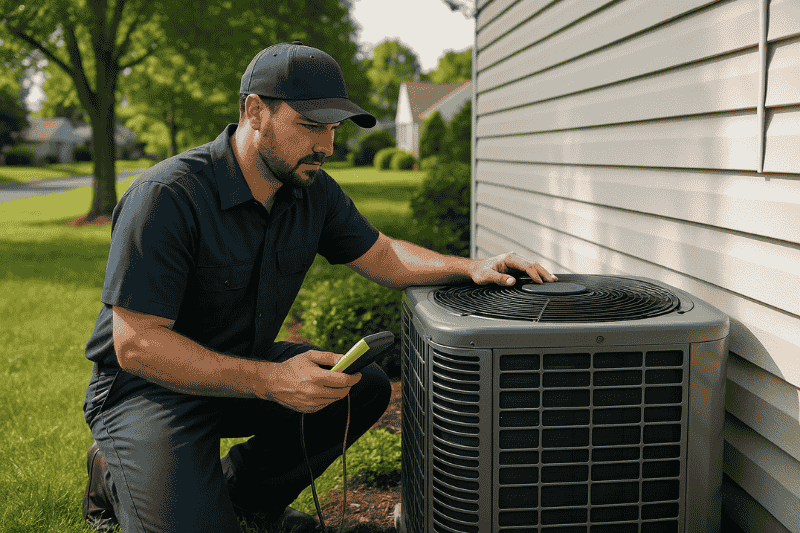Summary
Most air conditioners last 10 to 15 years, but lifespan depends on how much you use them, how well they’re maintained, and whether they’re the right fit for your home. Learning the key signs your system might need replacing and knowing what steps can help your next one last longer will save you stress and money down the road.
We'll cover what impacts how long your AC lasts, warning signs that it might be time for an upgrade, and simple ways to extend the life of your new system. Whether you're dealing with uneven cooling, rising energy bills, or just wondering how to plan ahead, this will help you stay comfortable and make smart, informed choices for your home.
For homeowners in Bucks County, summer comfort depends on a reliable air conditioner. But like all hardworking equipment, AC systems don’t last forever. On average, most air conditioners last 10 to 15 years. With good maintenance, some may reach closer to 20, but others may show signs of wear much sooner. Knowing what affects their lifespan and when it’s time to consider replacement can help you plan ahead and avoid unexpected breakdowns.
What affects how long an air conditioner lasts
Every home and system is a little different, but some key factors play a big role:
- Usage patterns: Homes where the AC runs nearly nonstop during hot summers will see more wear over time.
- Maintenance habits: Regular service, clean filters, and prompt repairs can keep parts running smoothly and extend the system’s life.
- Installation quality: A properly installed system, correctly sized for your home, will operate more efficiently and last longer.
- System type and efficiency: Higher-end models with better energy ratings are often built with longer-lasting components.
- Refrigerant type: Older systems using phased-out refrigerants are harder and more costly to maintain today.
Signs it may be time for a replacement
Air conditioners don’t usually fail without warning. Watch for these signs:
- Frequent repairs or repeated service calls
- Rising energy bills that don’t match your usage
- Hot or humid spots in certain rooms
- Unusual noises or strange smells when the system is running
- A system that’s 12 years or older and showing any of the above issues
Repair or replace?
Many homeowners wonder whether it’s worth repairing an aging system. A helpful rule is the 50 percent rule: if the cost of repair is more than half the cost of a new unit, replacement usually makes more financial sense.
Modern systems also offer energy savings, improved comfort, and often come with rebates or financing options that help ease the upfront cost.
How to help your next system last longer
If you’re installing a new system, a few smart moves can help protect your investment:
- Make sure the system is properly sized for your home.
- Ask about adding ductless AC options to target rooms that need extra comfort. You can read more about the benefits here.
- Consider adding an air purifier, which helps your AC run more efficiently and improves indoor air quality. Learn how that helps here.
- Sign up for a regular maintenance plan. If you’re wondering if those plans are worth it, check out the details here.
- Keep up with yearly maintenance to catch small issues before they become costly problems.
If you like home tips and want to see behind-the-scenes looks at our local projects, follow us on Instagram. We share updates, offers, and ideas to help you keep your home comfortable all year.

Frequently Asked Questions About How Long Do Air Conditioners Last
Q: How do I find out how old my AC is?
A: Look for the manufacturer label on the outdoor unit, which will show the manufacture date or serial number. If you’re not sure how to read it, we’re happy to help.
Q: Does a new AC lower energy costs?
A: Yes. Newer systems are designed to be more efficient, so you’ll likely see savings on your energy bills right away.
Q: Can I replace just the outdoor unit?
A: In some cases, but it’s usually best to replace indoor and outdoor components together to maximize efficiency and system life.
Q: What’s the best time of year for AC replacement?
A: Spring or fall can be good times, but if your system is failing, there are often rebates or financing options that make upgrading affordable even in summer.
Q: How long does installation take?
A: Most installations can be completed in a day, depending on the complexity of your system and setup.
Q: Do I need to replace my ductwork too?
A: Not always, but if your ductwork is leaky or undersized, replacing it alongside your system can improve overall comfort and efficiency.
Q: How can I make my AC last longer?
A: Annual tune-ups, regular filter changes, and addressing repairs early can all help extend your system’s life.
Q: What’s the average lifespan if I keep up with maintenance?
A: With regular care, many systems last 15 to 20 years, especially higher-end models.


